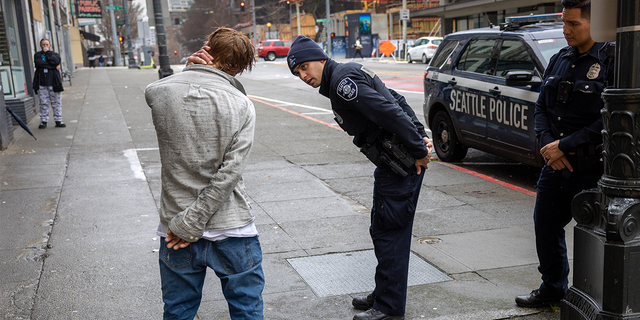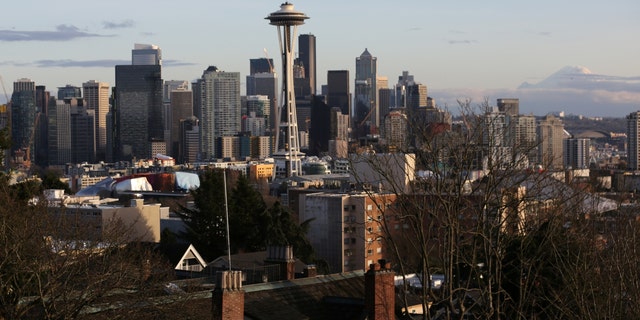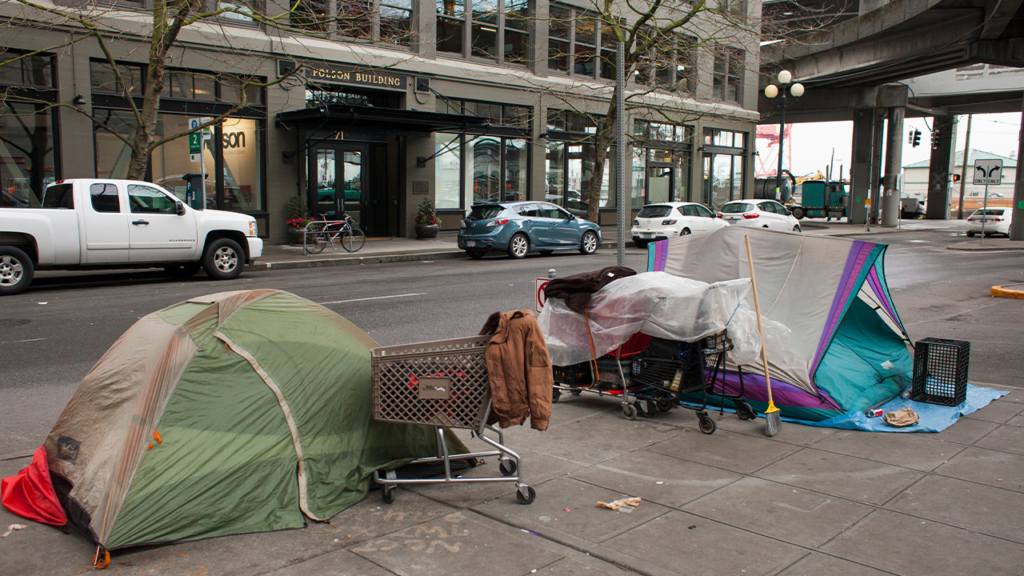Matthew Humphrey, owner of Steele Barber, on how Seattle’s small businesses are being negatively impacted by the increase in crime, including the Starbucks outlets that have closed.
NEW Fox News articles can now be heard on audio! In order to stop RVs and homeless encampments from developing or returning to a region, business owners and property owners in Seattle are placing 1-ton concrete blocks on city streets.
According to business owner JW Harvey, who spoke to The Seattle Times, “Individual businesses and residents are putting ecology blocks out as taking matters in their own hands because if they call the city and say there are RVs out in front of their business or out front of their home, they cant do anything about it.”
To stop RVs from parking and homeless encampments from growing, anonymous Seattleites have used special equipment to carry the large 1 to 2-ton “ecology blocks” or “eco blocks” outside residential zones and in front of businesses.
Homelessness has been a problem in Seattle for a long time, and it got worse during the pandemic. In 2020, Seattle and King County had about 11,700 persons living on the streets, making it the third-highest concentration of homeless people in the country. At 30 per 10,000 residents, Washington State has the fifth-highest rate of homelessness in the nation.
According to an earlier Seattle Times investigation, there were more encampments in Seattle and its county during the epidemic, with a 50 percent rise in tents in the city’s downtown. According to King County Regional Homelessness Authority data, 13,368 people were homeless in 2022, an increase of over 14% from the previous year’s figures.
RVs and other large vehicles are only permitted to be parked in the city’s industrial zones, but parking enforcement was suspended during the pandemic. The Seattle Times said that after that, unidentified individuals installed more eco-blocks in front of houses and businesses, particularly in the neighborhoods of Georgetown, Ballard, and Sodo.
Just in June, a city health club informed its members and followers on social media that once the city cleaned out a homeless camp, the gym will erect eco-blocks close to its building.
The West Seattle Health Club stated in a letter from June that it was working with other businesses to install eco-blocks around the area to prevent the encampment from returning.
According to Erin Goodman, executive director of the Sodo Company Improvement Area, safety for customers and employees is frequently a top issue for business owners, who are also concerned about losing their livelihoods if they install the barriers.
According to Goodman, there are more risks and pressures associated with operating a business close to a camp for the homeless. While fires started at RVs and homeless camps could harm commercial structures, encampments can draw rodents that could harm food producers and restaurants.

On March 14, 2022, in downtown Seattle, police officers check on a man who claims to have been smoking fentanyl. (Getty Images/John Moore)
Since the epidemic upended society in 2020 and riots and protests swept the country following the death of George Floyd, crime has also skyrocketed in Seattle. The number of homicides increased by 61 percent in 2020 compared to 2019, marking the city’s highest murder rate in 26 years. According to earlier data, violent crime as of April this year had increased 32% from 2021.
JW Harvey, a company owner in Georgetown, told the publication that although he had previously resisted placing eco-blocks because they would obstruct parking and were unsightly, the “ripple effects” of doing business next to the encampments had worn him out.
He claimed that during the past ten years, but particularly during the pandemic, he has spent more time conversing with those residing in the encampments and giving them water and tools than really working. Harvey noted that many store owners believe eco-blocks are their only option to keep the encampments away from their establishments, citing the fact that it only takes a few weeks for a homeless encampment to reappear in a space that the city has already cleansed and cleaned.
Although it is unlawful to install an eco-block on a city street, The Seattle Times study reveals that the city has not compelled the removal of the blocks. There are hundreds of similar blocks on Seattle’s streets, but just 25 property and business owners have received notices that failure to remove the blocks by June 2021 could result in fines. The sanctions are as follows: $250 for a first offense, $500 for a second, and $1,000 for a third. The number of fines that a person or company can obtain in a calendar year is unlimited.
According to the report, none of the 25 individuals or proprietors who were issued warnings over the blocks also received a ticket.
Goodman told the site, “I don’t think ‘warnings’ are going to deter anybody. They continue to do it, and even during the time before the city takes notice, they feel some relief.
Homeless outreach activists said that it is unjust that homeless individuals are subject to fines for parking in prohibited locations while those who install the blocks are not subject to the same level of enforcement. This was brought up as parking enforcement in the city resumed this year.
According to Bill Kirlin-Hackett, the director of the Interfaith Task Force on Homelessness, “the new mayor ran on a law-and-order platform and this is the law.” We simply think that to be quite hypocritical.
One man who has spent six years living out of his RV told the publication that the eco-blocks are signs of prejudice against the homeless.

Seattle’s skyline as viewed from the Space Needle and Mount Rainier on February 11, 2017. Chris Helgren for Reuters
The community has a lot of resentment against us, according to Garth Caroll. The only goal is to survive till we can find a permanent housing.
In response to concerns, the city stated that it was challenging to identify the person(s) responsible because eco-blocks are sometimes anonymously deposited in areas with numerous businesses or residences. The Seattle residents who put up the blocks frequently do it shortly after Seattle Public Utilities workers ask RVs to move off a street so they can clean.
Although personnel do not “continuously police the city searching for infractions,” the city claimed that it did respond to public complaints concerning environment blocks. It also comes down to how much it will cost to move the large blocks. Although the city does not remove the eco-blocks, it does have arrangements with towing companies to remove vehicles from illegally parked cars.
The offices of Seattle Mayor Bruce Harrell and the Seattle Department of Transportation did not immediately reply to requests for comment from Fox News Digital.













